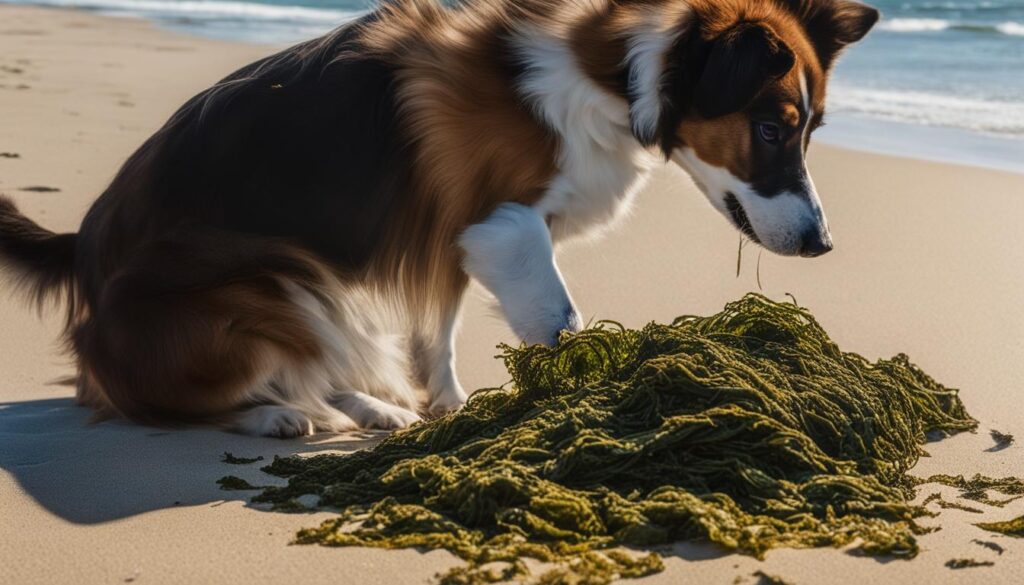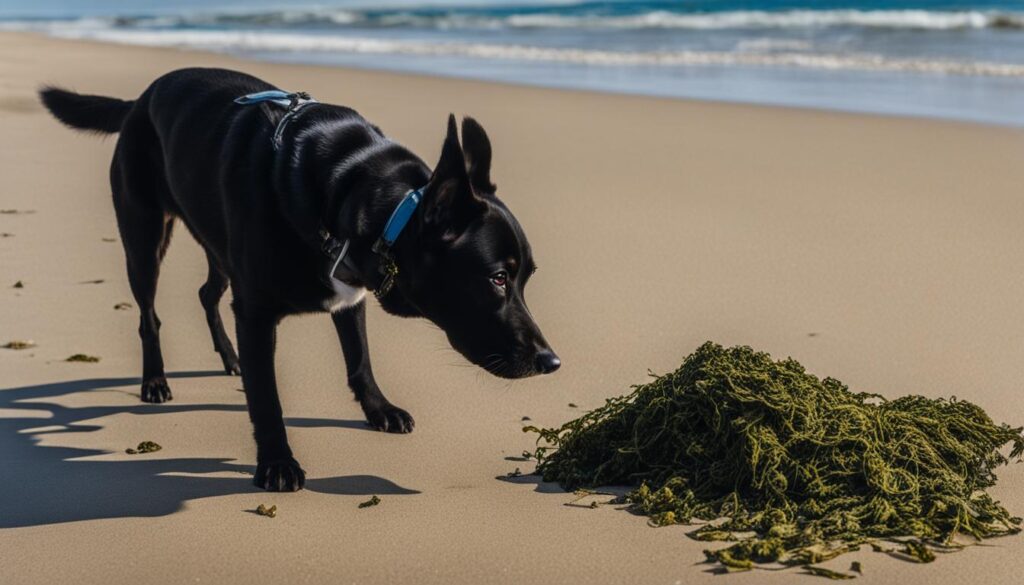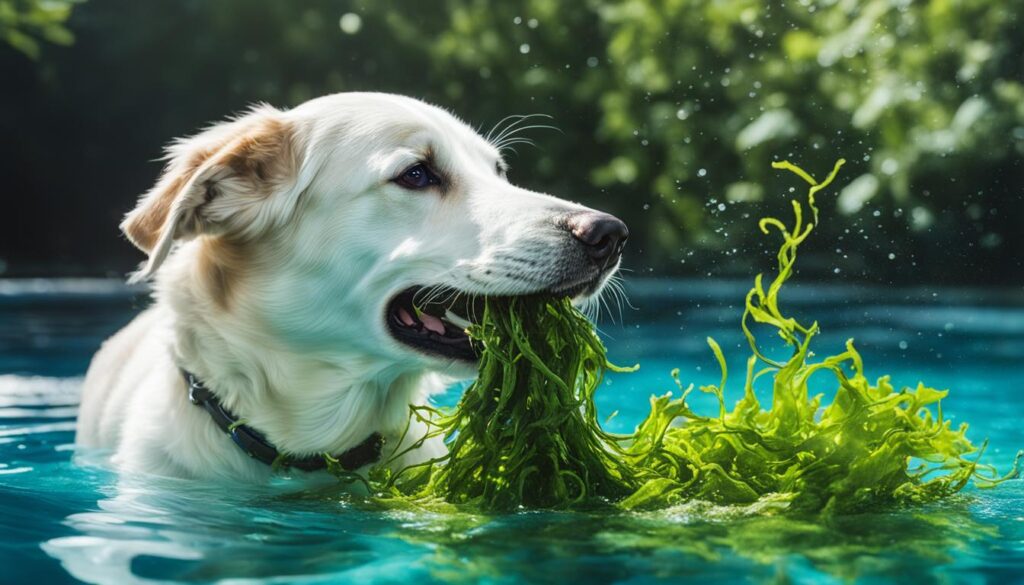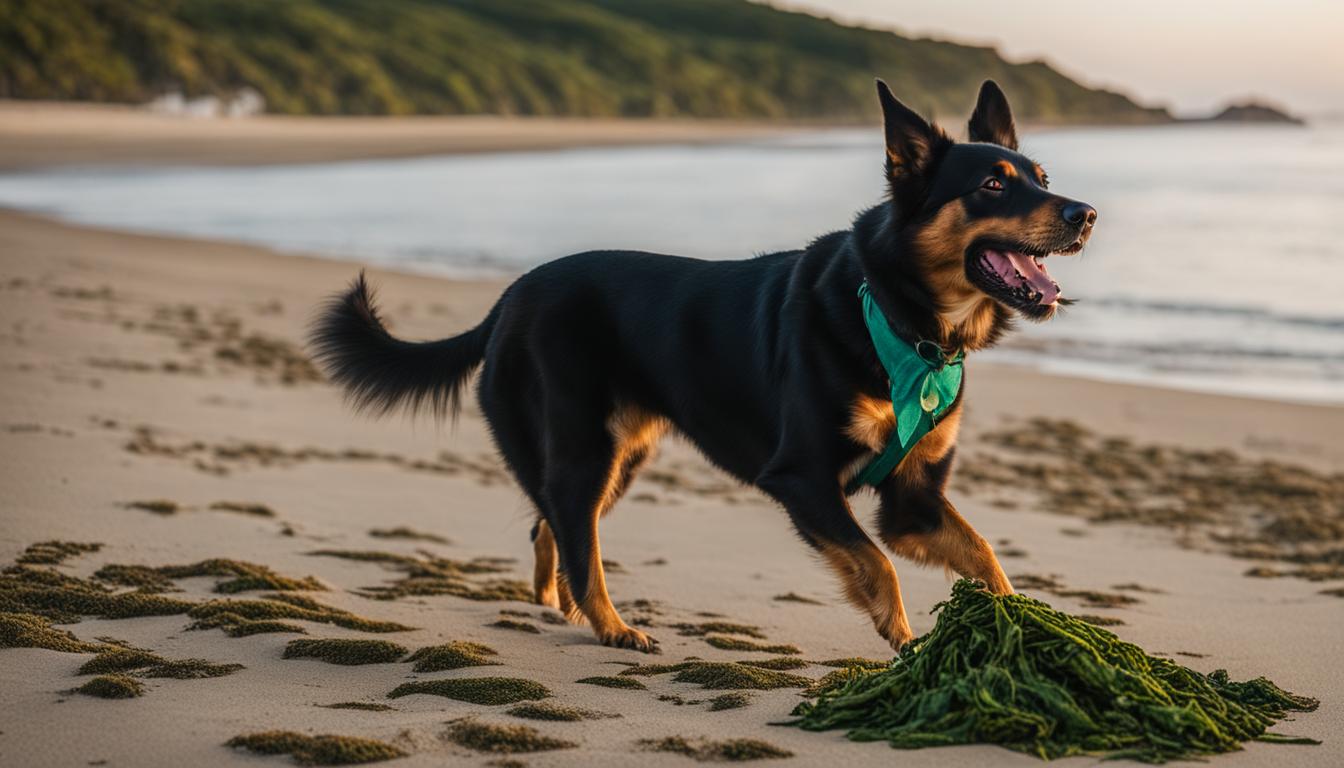As a dog owner, you may be curious about whether seaweed is a safe and nutritious addition to your furry friend’s diet. Well, the answer is yes! Seaweed, a marine vegetable, can offer several benefits to dogs when given in moderation and with caution. Let’s dive deeper into the world of seaweed and explore how it can positively impact your dog’s health.
Key Takeaways:
- Seaweed can be a safe and nutritious addition to your dog’s diet.
- Plain, unseasoned seaweed snacks or sheets can be shared with dogs as a healthy treat.
- Seaweed is rich in nutrients like iodine, antioxidants, vitamins, iron, and Omega-3 fatty acids.
- Avoid seaweed snacks with added seasonings and feed seaweed to dogs in moderation.
- Consult with a veterinarian before introducing seaweed or seaweed supplements to your dog’s diet.
Health Benefits of Seaweed for Dogs
Seaweed offers a myriad of health benefits for dogs, making it a valuable addition to their diet. Rich in essential nutrients, seaweed contains protein, iron, iodine, magnesium, and Omega-3 fatty acids. These nutrients play a crucial role in supporting various aspects of your dog’s well-being.
Iron, found in seaweed, promotes healthy red blood cells, which are vital for oxygen transport throughout the body. Omega-3 fatty acids contribute to brain development and support a robust immune system. Magnesium, another nutrient present in seaweed, aids in the proper functioning of the immune and nerve systems.
“Seaweed is nature’s way of providing a rich source of nutrients for dogs. Its high iodine content is especially beneficial for dogs with thyroid issues.”
Kelp, a type of seaweed, is commonly used in supplements designed specifically for dogs. These supplements harness the natural nutritional benefits of seaweed, providing additional health support for your furry friend. However, it’s important to choose supplements that do not contain garlic or onions, as these can be toxic to dogs.
Table: Nutritional Content of Seaweed
| Nutrient | Amount per 100g |
|---|---|
| Protein | 2.3g |
| Iron | 2.1mg |
| Iodine | 16mg |
| Magnesium | 69mg |
| Omega-3 fatty acids | 110mg |
By including seaweed in your dog’s diet, you can provide them with important nutrients that support their overall health. Whether you opt for introducing plain seaweed as a snack or incorporate seaweed supplements, consult with your veterinarian to determine the appropriate amount and ensure it aligns with your dog’s specific dietary needs.
The Right Way to Feed Your Dog Seaweed
Feeding your dog seaweed can be a great way to provide them with additional nutrients, but it’s important to do so in the right way. Here are some tips on how to feed your dog seaweed:
In Moderation
When it comes to feeding your dog seaweed, moderation is key. While seaweed is nutritious, it also contains iodine, which can have an impact on your dog’s thyroid function if consumed in excessive amounts. It’s best to give your dog small amounts of plain, unseasoned seaweed as a treat or as part of a balanced homemade meal.
Dried Seaweed
When choosing seaweed for your dog, opt for dried varieties. Dried seaweed is easier for dogs to digest compared to fresh seaweed. Avoid giving your dog seaweed snacks that have added seasonings, as these can be difficult for dogs to process and may contain toxic ingredients like garlic or onion.
In Homemade Dog Food
If you prefer to prepare homemade dog food for your furry friend, seaweed can be a valuable addition. You can incorporate dried seaweed into your dog’s meals as a nutritional supplement. However, it’s important to consider the iodine content of the seaweed and ensure that your dog’s overall diet is balanced and meets their specific nutritional needs.
By following these guidelines, you can safely incorporate seaweed into your dog’s diet and provide them with additional nutrients. Remember to consult with your veterinarian before making any changes to your dog’s diet, especially if they have any pre-existing health conditions or dietary restrictions.

Potential Dangers of Seaweed for Dogs
While seaweed can offer numerous benefits to dogs, it is important to be aware of the potential dangers associated with its consumption. Not all dog breeds can safely consume seaweed, as some may have sensitivities or allergies to it. It is crucial to observe your dog for any adverse reactions, such as itching, rashes, or digestive issues, and discontinue feeding it seaweed if any negative symptoms arise.
Dried seaweed, when ingested in large quantities, can expand in a dog’s stomach and cause gastrointestinal blockages, leading to discomfort and potentially requiring medical intervention. It is crucial to feed your dog seaweed in moderation and monitor their intake closely. If you notice any signs of digestive distress or if your dog exhibits symptoms such as vomiting, diarrhea, weakness, or lethargy, contact your veterinarian immediately.
Seaweed at the beach may seem like a tempting snack for your dog, but it is best to prevent them from consuming it. Wild seaweed can contain excessive amounts of salt, which can be toxic to dogs and lead to salt toxicosis. Additionally, seaweed found at the beach may harbor hidden animals, parasites, bacteria, or fungus that could make your dog ill. It is always better to err on the side of caution and avoid allowing your dog to eat seaweed at the beach.
Seaweed poisoning in dogs is a rare but possible occurrence. Symptoms of seaweed poisoning can include vomiting, diarrhea, lack of coordination, weakness, and seizures. If you suspect your dog has ingested a toxic type of seaweed or is experiencing symptoms of poisoning, seek immediate veterinary assistance. Be prepared to provide information about the specific type of seaweed consumed, if possible. Early detection and treatment will greatly increase the chances of a positive outcome for your furry companion.
Remember, while seaweed can offer certain health benefits, it is essential to exercise caution and consult with your veterinarian before introducing it into your dog’s diet. Each dog is unique, and what works well for one may not be suitable for another. By being informed and proactive, you can ensure the safety and well-being of your canine companion.

Can Dogs Eat Seaweed Snacks or Supplements?
When it comes to seaweed, dogs can enjoy certain varieties in moderation, but there are some important factors to consider before offering them seaweed snacks or supplements. While plain, unseasoned seaweed can be nutritious for dogs, it’s best to avoid giving them seaweed snacks designed for human consumption. Seaweed chips and other snacks often contain seasonings like garlic and onion, which can be harmful to dogs.

To provide your dog with the benefits of seaweed, look for specific seaweed treats or supplements formulated for dogs. These products are made with dog-friendly ingredients and offer the nutritional benefits of seaweed without any harmful additives. Always follow the recommended serving sizes and consult with your veterinarian before introducing new supplements into your dog’s diet.
If you’re a fan of sushi and wonder if your dog can have a taste, it’s best to steer clear. The seaweed used in sushi, known as nori, is typically seasoned with salt and other flavors that are not suitable for dogs. Keep the sushi for yourself and stick to dog-friendly seaweed options for your furry friend.
In summary, while dogs can eat certain types of seaweed, it’s important to be cautious about the specific products and varieties you offer them. Avoid giving dogs seaweed snacks meant for humans, and instead, opt for seaweed treats or supplements made specifically for dogs. As always, consult with your veterinarian to ensure you’re making the best choices for your dog’s health and well-being.
Can Dogs Eat Seaweed at the Beach?
While it may be tempting to let your pup munch on seaweed found at the beach, it’s important to know the potential risks involved. Dried seaweed can expand in a dog’s stomach when mixed with water, leading to bloating and gastrointestinal obstructions. This can be a serious health concern for your furry friend. In addition, seaweed at the beach may be soaked in seawater, which is high in sodium and can lead to salt toxicosis in dogs. It’s best to prevent your dog from consuming seaweed at the beach to avoid these potential dangers.
Furthermore, wild seaweed found at the beach can carry hidden animals or parasites that may be harmful to dogs. Bacteria and fungus may also be present on wild seaweed, posing a risk of infection or illness if ingested. To ensure the well-being of your pet, it is recommended to keep them away from wild seaweed and seek veterinary advice if ingestion occurs. As a responsible pet owner, it’s always better to err on the side of caution when it comes to your dog’s health and safety.
Remember, seaweed can still be a beneficial addition to your dog’s diet when fed in moderation and with caution. However, it is essential to source seaweed from safe and reliable sources, such as pet-specific seaweed supplements or plain, unseasoned seaweed snacks. Consult with your veterinarian before introducing seaweed or seaweed supplements to your dog’s diet to ensure it aligns with their specific health needs.
| Risks of Dogs Eating Wild Seaweed at the Beach | Precautions to Take |
|---|---|
| 1. Gastrointestinal obstructions | 1. Prevent your dog from consuming seaweed at the beach. |
| 2. Salt toxicosis due to high sodium content | 2. Keep your dog away from seaweed soaked in seawater. |
| 3. Hidden animals or parasites on wild seaweed | 3. Seek veterinary advice if ingestion of wild seaweed occurs. |
| 4. Bacteria and fungus present on wild seaweed | 4. Choose seaweed from safe and reliable sources. |
As a responsible pet owner, it’s crucial to prioritize your dog’s safety and well-being. While seaweed has its benefits, it’s best to avoid letting your dog consume seaweed found at the beach due to potential risks of gastrointestinal obstructions, salt toxicosis, hidden animals or parasites, and the presence of bacteria or fungus. Consult with your veterinarian to determine the best way to incorporate seaweed into your dog’s diet safely, whether through pet-specific supplements or plain, unseasoned snacks.
Conclusion
Seaweed can be a paw-some addition to your dog’s diet, providing a range of nutrients that support their overall health and well-being. From iodine to iron, magnesium to Omega-3 fatty acids, seaweed offers a natural boost to your furry friend’s nutrition.
However, it’s important to feed seaweed to dogs with caution. Stick to plain, unseasoned seaweed and avoid snacks with added seasonings that may be toxic to dogs. Remember, moderation is key, so only offer small amounts of seaweed to your canine companion.
While seaweed can be a tasty treat, it’s a no-no when found at the beach. Wild seaweed can contain high levels of salt, which can lead to salt toxicosis in dogs. It may also harbor hidden nasties like bacteria or parasites. Play it safe and prevent your dog from munching on beach seaweed.
If you’re considering adding seaweed or seaweed supplements to your dog’s diet, it’s always a good idea to consult with your veterinarian. They can provide guidance tailored to your dog’s specific needs and ensure that seaweed is a safe and beneficial choice for your furry companion.
FAQ
Can dogs eat seaweed?
Yes, seaweed can be a safe and nutritious addition to a dog’s diet when fed in moderation and with caution.
Can dogs eat seaweed snacks?
Dogs can eat seaweed snacks, but it is important to choose plain, unseasoned seaweed without added salt or garlic.
What are the health benefits of seaweed for dogs?
Seaweed is rich in nutrients such as protein, iron, iodine, magnesium, and Omega-3 fatty acids, which support overall health and well-being in dogs.
Can dogs eat seaweed in homemade dog food?
Yes, seaweed can be added to homemade dog food recipes as a nutritional supplement. However, the iodine content should be considered.
Is seaweed safe for all dog breeds?
Seaweed is generally safe for dogs, but some dogs may have sensitivities or allergies to seaweed. It is best to consult with a veterinarian.
Can dogs eat seaweed snacks or supplements meant for humans?
No, dogs should avoid eating seaweed snacks or supplements meant for humans, as they may contain toxic ingredients like garlic and onion.
Can dogs eat seaweed at the beach?
It is not recommended to let dogs eat seaweed at the beach, as it can expand in their stomach and may contain excessive salt or hidden animals.





